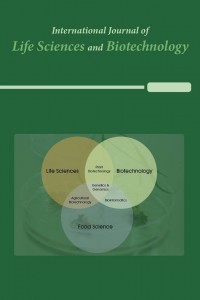
International Journal of Life Sciences and Biotechnology
Yazarlar: Sila ARSLAN, Dilan AKAGÜNDÜZ, Rumeysa CEBECİOGLU, Aykut KUL, Tunç ÇATAL
Konular:Biyoloji
DOI:10.38001/ijlsb.962106
Anahtar Kelimeler:Lactic acid bacteria,Lactobacillus delbrueckii subsp. Bulgaricus,Pinecone,Streptococcus thermophilus,Yoghurt
Özet: OBJECTIVE: The goal of this study was to ferment yoghurt from milk using lactic acid bacteria found in pinecones and to examine the cell viability and lipid peroxidation levels of the fermented yoghurt on Vascular Endothelial Cell Line ECV304. METHODS: ECV304 was cultured in vitro. To determine cell viability, various concentration of yogurt extract fermented with pinecone were given to cultured cells using the MTT Assay. At the same doses as the MTT Assay, the Lipid Peroxidation (LPO) Assay was employed to evaluate the malondialdehyde (MDA) levels of cells. Acridine orange/Ethidium Bromide staining technique was applied to detect apoptosis. Gas Chromatography-Mass Spectrometry was used to identify the volatiles in yoghurt fermented with pinecone. RESULTS: All dosages of pinecone fermented yogurt enhanced cell viability of the human healthy vascular endothelial cell line ECV304 and decreased MDA levels, as validated by fluorescence microscopy pictures. The primary essential oils identified in yogurt fermented with pinecone were hexadecanoic acid, eicosanoic acid, stearic acid, and 2-palmitoylglycerol. CONCLUSIONS: In this work, the effects of yogurt fermented with pinecones on human healthy cell lines were examined for the first time. The study discovered that this yoghurt promotes the proliferation of healthy human cells while decreasing oxidative stress in these cells.